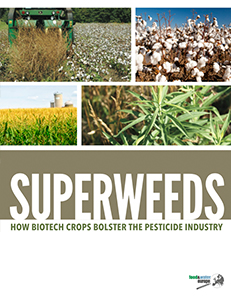EU Version – Superweeds: How Biotech Crops Bolster the Pesticide Industry
Food & Water Watch evaluated data from the International Survey of Herbicide Resistant Weeds that reveal burgeoning herbicide-resistant weeds caused by the over-reliance on glyphosate for broad control of weeds.
Genetically engineered (GE) crops — usually called “genetically modified” (GM) outside the U.S. — were first approved in the United States in the 1990s, and since then the United States has been the biggest global adopter of this technology. GE crops were supposed to improve yields, lower costs for farmers and reduce agriculture’s environmental impact. Yet nearly 20 years after their introduction, genetically engineered crops have not provided the benefits promised by the companies.
VIEW ON SCRIBD
Food & Water Watch examined U.S. Department of Agriculture (USDA) and U.S. Environmental Protection Agency (EPA) data to document the increased use of herbicides that has accompanied the adoption of herbicide-tolerant GE crops. Our analysis looks at the rapid proliferation of GE crops and affiliated pesticides in the United States and points out the interdependent relationship between these two industries that also fuels the crisis of weed resistance. Food & Water Watch evaluated data from the International Survey of Herbicide Resistant Weeds that reveal burgeoning herbicide- resistant weeds caused by the over-reliance on glyphosate for broad control of weeds. These data make it clear that the problem of herbicide-resistant weeds will not be solved with the intensified use of older, more toxic herbicides like 2,4-D and dicamba.
Learn more about superweeds in our new video:
[gn_media url=”http://www.youtube.com/watch?v=US6zjWJSM4Y” width=”600″ height=”400″]



